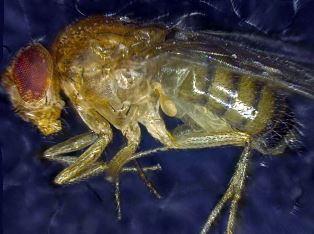Lifespan extended by 50% by activating gene that kills unhealthy cells
19 January 2015
Research at the University of Bern has has found a way to considerably prolong lifespan, but only in fruit flies so far, by activating a gene which destroys unhealthy cells. The results could also be applicable to humans as we have the same gene.
Researchers at the Institute of Cell Biology at the University of Bern in Switzerland have developed a new method to extend lifespan of flies based on improved selection of the best cells within the body. Their research has been published in the journal Cell.
"Our bodies are composed of several trillion cells", explains research leader Eduardo Moreno, "and during ageing those cells accumulate random errors due to stress or external insults, like UV-light from the sun." But those errors do not affect all cells at the same time and with the same intensity, "Because some cells are more affected than others, we reasoned that selecting the less affected cells and eliminating the damaged ones could be a good strategy to maintain tissue health and therefore delay ageing and prolong lifespan."
A cellular quality control mechanism
Moreno's team identified a gene in the common fruit fly Drosophila melanogaster which was activated in less healthy cells. The gene selectively targets less healthy or less fit cells to protect the integrity and health of the organs like the brain or the gut. The researchers called the gene ahuizotl (azot) after a mythological Aztec creature selectively targeting fishing boats to protect the fish population of lakes.

A Drosophila melanogaster fruit fly.
Source: Institute for Cell Biology, University of Bern
Normally, there are two copies of this gene in each cell. By inserting a third copy, the researchers were able to select better cells more efficiently. The consequences of this improved cell quality control mechanism were, according to Moreno, "very exciting": The flies appeared to maintain tissue health better, aged slower and had longer lifespans. "Our flies had median lifespans 50 to 60% longer than normal flies", said Christa Rhiner, one of the authors of the study.
The gene azot is present in humans, so this opens the possibility that selecting the healthier or fitter cells within organs could in the future be used as an anti-ageing mechanism. For example, it could prevent neuro- and tissue degeneration produced in our bodies over time.
Reference
Merino MM, Rhiner C, Lopez-Gay JM, Buechel D, Hauert B and Moreno E. Elimination of unfit cells maintains tissue health and prolongs lifespan. Cell, 2015 (in press) DOI: 10.1016/j.cell.2014.12.017.